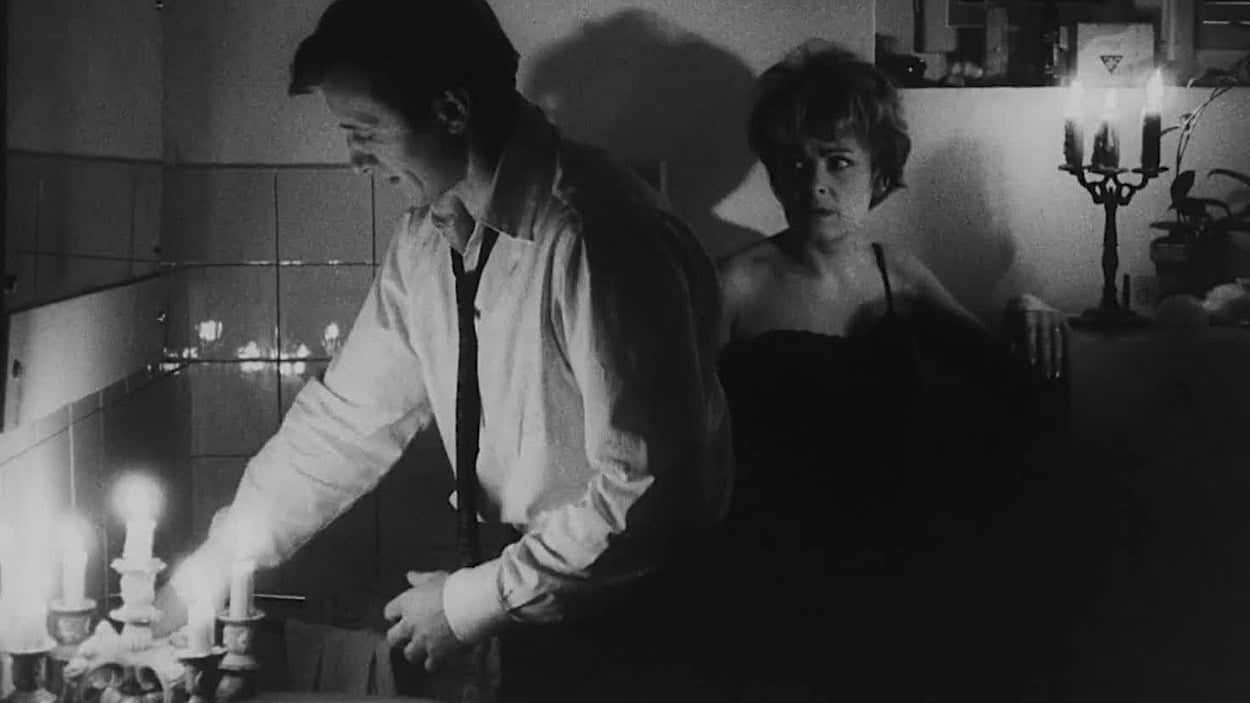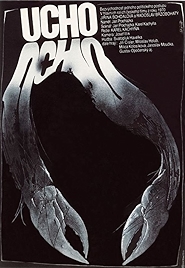When director Karel Kachnya was making The Ear (aka Ucho), released in 1970 but not seen until 1990, he must have known it wasn’t going to be seen. Surely? How could he not?
We’re in Communist Czechoslovakia, where a married couple are coming home from a Party party. Anna (Jiřina Bohdalová) is drunk and bursting for a piss, Ludvik (Radoslav Brzobohatý) is tired and anxious. Has it been a good evening? Has he said the right thing to the right people? Was the party they were at another leg up in his reasonably glittering career or something else? Ludvik isn’t sure.
And now, it seems, they can’t find the keys to the front door. Her fault. His fault. They bicker. Eventually they get in and, it seems, the front door wasn’t locked after all. Odd. There is no electricity. Odder. The phone isn’t working either. Odder still. And yet next door the lights are all on and the couple who live there – also Party high-ups – can be seen moving about.
There’s a car outside on the street with people in it and the lights off. Inside the house, in the kitchen where they are certain they cannot be heard by what they call “the ear” (listening devices planted by the secret police) they discuss what it can all mean – the unlocked doors, the lack of electricity, the evening’s events at the party and the way favour ebbs and flows in a manner that passeth all human understanding.
Ludvik becomes convinced that over the course of the evening “something” has shifted decisively and that moves are now being made to enact yet another purge, and that this time he’s going to be out.
A long night of the soul plays out, largely focused on Ludvik and Anna, though with flashbacks to the party, where small talk about the pouring of concrete at low temperatures mixes with oompah waltzes and barely veiled power plays. Back in the house, Ludvik and Anna squabble. She’s drinking vodka from the bottle and becoming increasingly unguarded in what she says while he is fretting and burning documents, blocking the toilet and setting fire to the toilet seat in the process.
A portrait of a marriage and of a system relying on total surveillance, The Ear was the latest in a string of successful collaboration between director Kachnya and writer Jan Procházka. All were critical of the system but only The Ear managed to get itself banned instantly. What’s peculiar about it is its modus operandi. Dissident cultural artefacts don’t usually go about things this way. Writers and directors criticising the way of life behind the Iron Curtain usually did it from behind a wall of allegory, fairytale, comedy, history or… something. Like in Closely Observed Trains (Ostre sledované vlaky), fellow Czech Jirí Menzel’s comedy from 1966, which used the Nazis as a stand-in for the regime of the day.
There’s no intervening layer here. This is full-on attack. And it’s bolstered by the way Procházka and Kachnya, Bohdalová and Brzobohatý portray the marriage – clearly in trouble yet stout enough when the chips are down. It’s the opposite of the relationship between state and citizen. Anna and Ludvik gripe the whole time – about her drinking or his woeful performance in bed – but when push comes to shove they pull together. It helps that Bohdalová and Brzobohatý were a couple in real life. The two actors seem to be enjoying themselves.
A lot is made (rightly) of the paranoid American thrillers of the 1970s, like The Conversation, Three Days of the Condor or The Parallax View but in fact the great era of cultural paranoia was the 1960s (think The Manchurian Candidate or more comedically Dr Strangelove). This sits somewhere alongside those two, though it’s several degrees of magnitude smaller in scale.
It’s also in black and white, and thanks to the power cut at the home of Ludvik and Anna, which turns out to have a strategic importance, DP Josef Illík gets a licence to serve up stark monochrome imagery, with lighting often (seemingly) coming from a handheld candelabra or a cigarette lighter. In the flashbacks to the party, Illík gives us gargoyle close-ups of Party apparatchiks. We’re in no doubt where our sympathies should lie.
It’s a bold political statement, though a questionable one, since the film wasn’t seen until the Iron Curtain had fallen. “If a tree falls in the forest but no one is around to hear it” etc etc.
The Ear – Watch it/buy it at Amazon
I am an Amazon affiliate
© Steve Morrissey 2023


